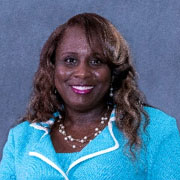
2020 Vision
What does the year and even decade ahead look like? You voted–via your blog, PM, and newsletter readership, conference session and webinar attendance, and social media likes–on the topics of most interest to you. So, we asked 20 local government experts how trends in these areas will shape our communities in the year and even decade ahead.

Equity and Inclusion
Advancing Racial Equity
Looking to the decade ahead, I predict that a critical mass of local jurisdictions will have a vision for racial equity. We will recognize that it is essential for local government to acknowledge the reality that government played a role in creating and maintaining racial inequities, and we will make a course correction – government proactively working to advance racial justice. We believe in a public sector for the public good, and for the public sector to be good, we have to normalize conversations about racial equity, operationalize new policies and practices, and organize to advance racial equity. It will be the decade of becoming all that we can and should be.
Resources

Julie Nelson
Julie Nelson is the Director of the Government Alliance on Race and Equity; Senior Vice President of the new Race Forward; and a Senior Fellow with the Haas Institute for a Fair and Inclusive Society (HIFIS) at the University of California, Berkeley. Nelson is the former Director of the Seattle Office for Civil Rights, where she served for eight years.

Budgeting
Budgeting for Customized Service Delivery
Increasingly, residents will become subscribers who expect customized public services, and local governments will deliver by leveraging technology and quasi-market processes. More public services will be brought under the subscription umbrella – utilities, parks, recreation, energy, communications, internet, emergency healthcare, highways, and public safety. Public service provision will be increasingly indistinguishable from that of private business. To stay relevant, local leaders must adapt to this uncomfortable reality. They will operate in a blurred economy balancing the preferences of subscribers with those of the community, ensuring equity and fairness. Ultimately, the primary role of the CAO will become the custodian of democracy, engaging residents in meaningful governance, the co-production of services, and ultimately as owners of the civic enterprise.
Resources

Robert L. (Bob) Bland, Ph.D.
Robert L. (Bob) Bland, Ph.D., is the Endowed Professor of Local Government in the Department of Public Administration and Faculty Director of the Center for Public Management at the University of North Texas. He teaches courses in public economics, governmental accounting, and budgeting. Bland is an Honorary Member of ICMA.

Economic Development
CAOs Must Intervene to Drive Suburban Redevelopment
The ICMA research on first suburbs leads me to conclude that far too many first suburbs are enduring a continuing, slow-moving market retraction. Tax bases are shrinking, poverty is spreading, houses are aging. Nothing on the horizon leads me to think this trend is going to correct itself. Instead, local government managers are going to have to intervene in the retracting first suburban real estate market. This will involve local governments proactively assembling redevelopment sites; razing old, failing strip centers; assuming developer risks; rezoning for greater densities; and more. This interventionist economic development approach will be challenging, though, if first suburban local managers don't lead, I am afraid nobody else will.
Resources

Tom Carroll
Tom Carroll is an ICMA Research Fellow focusing on Best Practices to Foster Revitalization in Modest First Suburbs. He is the Village Manager of Silverton, Ohio, and has more than 20 years of local government management experience.

Cybersecurity
Cyberattacks Continue with Increasing Frequency
Cybersecurity will look a lot like it looked last year with frequent—if not constant—cyberattacks, especially ransomware attacks. The state, and perhaps federal, government may act to prevent local governments from paying off ransomware attackers because paying them off encourages more attacks and finances more cybercrime. Here are a few things local governments can do: create and maintain a culture of cybersecurity; address barriers to cybersecurity, especially funding and staffing; training, training, and more training for all end users; follow best cybersecurity practices; and don't go it alone…reach out to other organizations for information, expertise, and help.
Resources

Donald F. Norris, Ph.D.
Donald F. Norris, Ph.D., is an ICMA Research Fellow and Professor Emeritus, School of Public Policy at University of Maryland Baltimore Campus.

Communications and Engagement
Digital Disinformation on our Doorsteps
In the decade ahead, local governments will face additional digital challenges of disinformation. All over the world, so-called 'fake news' has roiled every level of government and caused nations to fray and, in extreme cases, caused services to grind to a halt. The success of these tactics, as well as the increasing sophistication and accessibility of targeted advertising, will no doubt bring disinformation to the doorsteps of town and city halls the world over. But as we've learned most recently from countering cyberthreats, even the most technical-seeming challenge can't be solved by IT alone. Like so many issues local government has faced before, digital disinformation is as much a new issue as it is a timeless challenge to trust and truth. Answering 'fake news' in our communities will require new ideas and cutting-edge solutions, but these solutions will be built on foundations of consistent community engagement, transparency, and ethical leadership.
Resources

Marc Ott
Marc Ott is the Executive Director of ICMA. Ott had a 30-year career in local government leadership, and most recently served as City Manager of Austin, Texas, for eight years.

Leadership
Engage Citizens to Overcome Incivility
Local government leaders will continue to experience hallmarks of continuing incivility--in public meetings, online, and even as they go about their personal business. The lack of civility is often a reflection of the frustration citizens experience when they attempt to have an issue addressed by city hall (that may not have the capacity to resolve it alone). In the coming year and decade, city managers will learn more democratic ways to engage with citizens in the coproduction of "public work," the work that only citizens can do if wicked community problems are to be effectively addressed.
Resources

Valerie Lemmie
Valerie Lemmie is Director of Exploratory Research at the Kettering Foundation, which focuses its research on "what it takes to make democracy work as it should."

Ethics
Ethical Obligations Remain Relevant
In this new decade, we will mark the 100th anniversary of the adoption of the ICMA Code of Ethics by members at the Montreal conference in 1924. The comprehensive review of the Code, launched in 2013, will come to a close only to be relaunched. Public service values are enduring but their practice is not necessarily so. Relevance requires consistent reflection, debate, and renewal. On the global stage, ICMA and its international affiliate partners will develop a shared set of public service values that all local governments can embrace to nurture that all too fragile, but essential, trust of the public they serve.
Resources

Martha Perego
Martha Perego, ICMA-CM, is the Director of Member Services and Ethics at ICMA. Previously, she served local governments in Pennsylvania and received an MPA from the University of North Carolina.

Gun Violence
Gun Violence Drives Emergency Management
Gun violence is the one crisis that threatens every local government, especially in the United States. Here are the facts: there are 400 million guns in the United States; 300 people are shot daily, including 20 children and teens; 33 mass shootings occurred in the past three years; 400 cities and 20 states have become Second Amendment sanctuaries; emotions will run high during the 2020 presidential election; Russia and other countries will foment discord and exploit our emotions; 2020 will be a violent year. It's not if, but when. Local government leaders must study after-action reports from past shootings and, above all, have a plan.
Resources

Ron Carlee
Ron Carlee, DPA, is Director of the Center for Regional Excellence, Strome College of Business, and Visiting Assistant Professor, School of Public Service at Old Dominion University. Carlee joined Old Dominion after a career in public service, most recently serving as City Manager of Charlotte, North Carolina.

Equity and Inclusion
Inclusion of Immigrant Communities
Diversity is not a vision, an opinion, or a belief. In cities, diversity is today's reality. Cities face the need to help transform society to become more inclusive and sustainable. The transformation takes place against a background of emotional political discussions and contentious debates about inequality and exclusion, about structural factors and personal responsibility, about the importance of language and the impact of culture. The UN Sustainable Development Goals, which pledge to 'leave no one behind,' can be used as a framework to achieve this transformation. Local governments can offer solutions by focusing on encounters, connections, and empowering underrepresented populations.
Resources

Colin Beheydt
Colin Beheydt is City Manager of Bruges, Belgium and is a member of ICMA Belgian affiliate Excello.

Innovation
Innovation Skills Solve Community Problems
With urgent challenges from climate change to inequality, all of us in local government need to know how to define a problem that is urgent, that matters to real people, and that can be addressed with practical solutions. We must know how to use data to understand the problem, and also how to deepen that understanding by consulting those affected. We must be able to scan rapidly for reliable evidence of what works. According to a 2019 ICMA survey, such skills may not yet be in widespread use but are in demand. By the end of the decade, the internet will make learning 21st century problem solving practical and imperative.
Resources

Beth Simone Noveck
Beth Simone Noveck is a Professor at New York University and Director of The Governance Lab. She is an ICMA Local Government Research Fellow.

Next Generation of Managers
Leading a Multigenerational Workforce
Leading agile organizations requires leaders to reframe their perceptions, attitudes, and expectations of generational diversity and begin to view these differences through different lenses. Today's workplace is composed of cohorts of at least four, perhaps five different generations of employees, each with unique perceptions, values, needs, expectations, work styles, and motivations. Transformative leadership requires leaders to appreciate, respect, and value the richness of this workplace mosaic and view diversity as a potential strength. Leaders can make the difference in helping organizations experience increased morale and enhanced collaboration by genuinely championing a culture of camaraderie, engagement, and development.
Resources

Priscilla Wilson
Priscilla Wilson is the newly appointed Chief People Officer of ICMA. She has a 25-year career in nonprofits and local government. Her most recent role was as a Senior Vice President with The Mercer Group. Prior to that, she served the city of Garland, Texas.

Innovation
Model for Studying Rapid Urbanization
The World's Cities in 2016 estimated that 90% of the world's urban population growth by 2050 is expected to occur in Asia and Africa. Many of these countries have socioeconomic profiles comparable to India. Local government management professionals around the world should look beyond the common perception of Indian cities as centres of extreme poverty and view their diversity of languages, climate zones, landscapes, and political parties, set on a democratic and cooperative federalism structure, and see India as poised to demonstrate innovative solutions. With a strong commitment to nurturing inclusive cities, India is home to a plethora of urban experiments. Intense development of a professional municipal workforce will be a necessity in the coming years to provide better services and a quality of life to the evergrowing populations.
Resources

Manvita Baradi
Manvita Baradi founded and leads the Urban Management Centre, ICMA's long-time partner in India. She has more than 25 years of technical experience developing and administering programs for local governments.

Transportation
Multimodal Defines Transportation
Technology, driven by consumer demand, will undoubtedly be the largest positive disruptor in shaping mobility for the coming year. The needs of the very communities we serve will shape the multimodal transportation trends that have already begun to evolve in past years. As government leaders, we will be challenged with being ready to adapt to, collaborate on, and support the desired growth of mobility linkages within urban, suburban, and rural neighborhoods. Building relationships early and leveraging strong partnerships with businesses, developers, transportation agencies, mobility service providers, and special interest groups are key in working together to innovate, experiment, and grow sustainably in 2020.
Resources

Yoko J. Igawa
Yoko J. Igawa manages public affairs for Foothill Transit in West Covina, California.

Leadership
Preparing Leaders for the Road Ahead
While 2030 seems far away, preparing emerging leaders for the challenges they may encounter begins now. When I entered local government, my mentors were preparing me for emerging technological advances. Social media was a new phenomenon. I encouraged my organization to change from a monthly printed publication to frequent limited character publications multiple times per day. For the next generation of managers, the advancements in technology will continue to reshape how communities engage and serve residents. In the era of instant gratification--say it now and confirm it later--managers will have to be prepared to serve, respond, and communicate in a manner that will be embraced. Trust and respect for government at all levels is on the decline; it will be important to know how to function is such a climate. The world continues to get smaller. Appreciate and respect that while the western culture has in recent history been leading in innovation, we must learn and utilize techniques and resources from around the globe.
Resources

Opal Mauldin-Jones
Opal Mauldin-Jones, ICMA CM, is City Manager of Lancaster, Texas. In 2018 she won the Trailblazer Award from Women Leading Government at the ICMA Annual Conference.

Technology
Privacy and Data Security
Personal privacy is being infringed upon in both developed and developing countries with the increasing number of online forms. Whether it's opening a rideshare account or applying for a public health card, citizens readily give up data on themselves or their family members. Even if citizens do not wish to share their private information, it can still be surreptitiously taken via the thousands of security cameras (CCTVs) in public and private spaces or delete-resistant super cookies on your phone or laptop browser. The security of the personal and biometric data taken from citizens is not guaranteed. In the year and decade ahead, local governments worldwide will need to help balance privacy and data security.
Resources

Jay Gonzalez, Ph.D.
Jay Gonzalez, Ph.D., is the Chair of the Department of Public Administration and Faculty Liaison to the ICMA Student Chapter at Golden Gate University. Also the author of Cybersecurity: Current Writing on Threats and Protection.

Public Safety
Reimagining the Fire Service
As demands for emergency services continue to shift, tomorrow's response system must evolve. A strong core response team will remain necessary to adequately address emergency situations and the response of the future will require personnel from different backgrounds, education, certifications, and training to provide the array of needed services to the community. The fire and rescue service are positioned to be the hub for many disparately scattered services within the jurisdiction they serve. Here are eight critical issues to consider going forward: Re-identification of the fire and rescue service; culture of the profession; robust use of data; health and wellness threats; partnerships; challenges; technology advancements and adoption; and inclusiveness of the fire and rescue service.
Resources

Randy R. Bruegman
Chief Randy R. Bruegman, (retired) CFO, FIFIReE, is past president of the Center for Public Safety Excellence and co-Chair the 21st Century Fire and Rescue Service Report, which will be released by ICMA and CPSE later this year.

Community Engagement
Tapping into the Arts to Engage residents
We are seeing the next wave of community engagement practice take hold, with artists, culture-bearers, and designers at the center. It's time to move away from contentious town halls and sticky dots. Arts-based community engagement practices often begin with storytelling, imagination, and interactive activities, so that communities can tap into the cultural identity, knowledge, and experience of its residents. And it's not limited to planning departments – health departments, public safety representatives, housing authorities, parks officials, and a wide range of community stakeholders are all turning to the arts sector to help them better understand the challenges communities face, identify new and creative ways of addressing wicked problems, bring together diverse cross-sector conversations, and create a new future.
Resources

Lyz Crane
Lyz Crane is the Deputy Director for ArtPlace America, which is partnering with ICMA in 2020 on development of a wayfinding guide to support local governments in leveraging creative placemaking strategies.

Climate Change
The Changing Climate
There have been many discussions on the reasons our climate is changing but not as many on how these changes will affect everyday life in our communities. 2020 will be the year when residents realize that climate change is at their doorstep. Fires in Australia, Africa, and North America; droughts; and other weather disasters are becoming more common and our citizens will begin to act locally. By the end of the decade, we will see more and more local best practices spread by social media to all parts of the world. Nature will force us to change the way we live our lives.
Resources

Peter Ágh
Peter Ágh is the Managing Director of ICMA Europe. He has a 15+ year career in city manager positions in several cities in Slovakia and served as President of Slovak City Managers Association for 8 years.

Leadership
Transformational Leadership for a New Decade
Leading local governments will mean moving beyond a focus on the transactional to the transformative. Local government managers will have to develop a new skillset in order to work more effectively with their staffs and citizens to understand that what we're building is a strong community whose mission, vision, and values go beyond collecting taxes and fixing potholes. The vision is to create a strong community of citizens who are fully engaged and a staff that works up to its full potential to build a city that continually evolves and develops. Leadership is about shared vision, values, and a sense of belonging or being a vital part of the organization or community.
Resources

Felicia Logan
Felicia Logan is the Director of ICMA Leadership Development at ICMA and has led programs in transformational leadership including ICMA's Athenian Project.

Sustainable Communities
Zero Waste Ambitions Drive Recycling
Municipalities will continue to shape successful sustainability programs related to recycling and solid waste over the coming years. As more communities aspire to pursue "zero waste," the realities surrounding the waste stream will require proper business contracts and rationale to attract partners who can invest in necessary infrastructure. Technology will play a role across the board, as classic recycling programs reset to align to the new normal caused by China Sword. California food/green waste programs focused on composting and power generation via anaerobic digestion will mature, while proper handling of electronics, medical waste, and universal waste will become more prevalent.

Richard Coupland III
Richard Coupland III is a Vice President of ICMA Strategic Partner Republic Services, an industry leader in U.S. recycling and nonhazardous solid waste disposal. The company serves 14 million customers in 41 states and Puerto Rico, and operates 91 recycling facilities.
yoko_igawa.jpg

Social Media
Social Media Threatening Democracy
Without local experimentation, social media will become a toxin in our soupe du démocratie. Misinformation and manufactured "truths" will infect communications on social media. Vitriol and childish rhetoric will spew from online personalities of individuals and institutions who should be above such antics. Local governments will be forced to do one of two things: invest in and experiment with approaches to speak truth to the powerless or stop using social media, including information sharing, so as not to be a party to the maintenance of platforms that threaten democracy. The first is essential; the second may be necessary for some.
Resources
Thomas Bryer
Thomas Bryer is Professor in the School of Public Administration at the University of Central Florida, as well as a Fulbright Scholar and Specialist with work completed in Lithuania and Russia on citizen participation with municipal governments. He is the author or editor of five books, including Social Media for Government: Theory and Practice.
^ Back to top